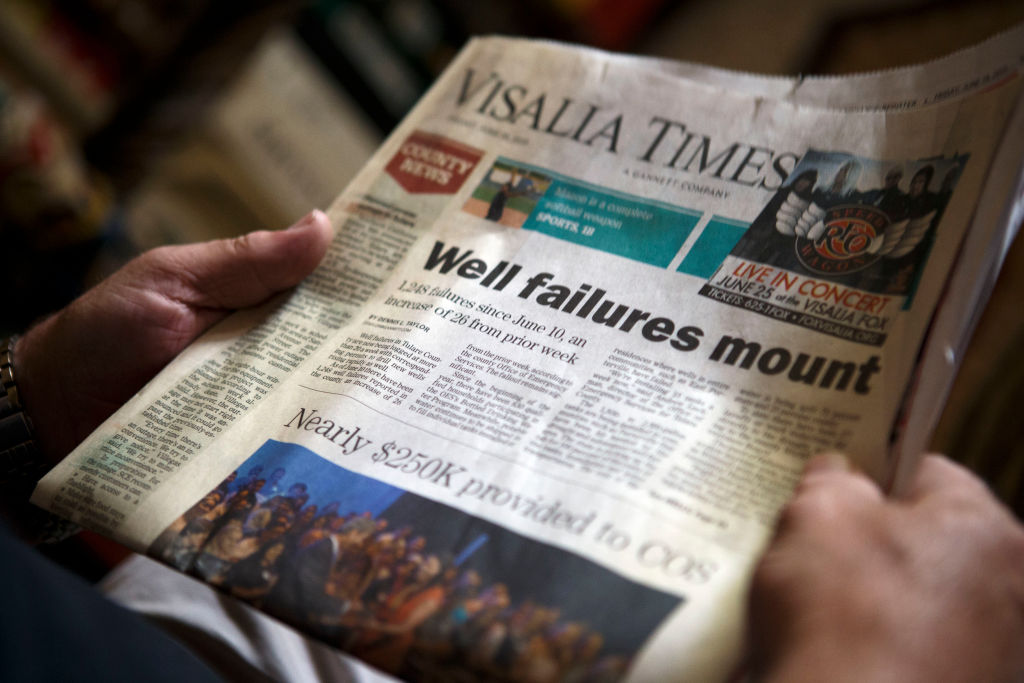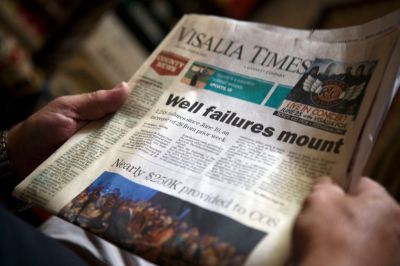The collapse of local news sometimes looks like a big city problem. Alarm bells rang when iconic dailies like the Denver Post and the Baltimore Sun slashed their staffs. The election of George Santos—whose many falsehoods and fabrications came to light only after he won a seat in Congress—cast a spotlight on the anemic local news in New York City.
Since Republicans are more likely to express skepticism than concern about the media, we might conclude that the fate of local news is an issue only for Democrats. In fact, more victims of this trend are probably Republican or conservative Americans, and they should care about strengthening local news.
Using 2020 election results and a dataset collected by professor Penny Abernathy of the Medill School of Journalism at Northwestern, I took a closer look at how local news is faring across the country. The outlook isn’t encouraging for smaller communities, which tend to be more conservative: Of the 205 counties nationwide with no newspapers in the dataset, 93 percent had fewer than 50,000 residents, and 74 percent of those counties without papers voted for Donald Trump in 2020. “More than half of the communities that have lost newspapers are in suburban or rural areas, where the population is shrinking, rather than growing,” Abernathy wrote in a 2022 report on the state of local news.
Between 2004 and 2022, approximately 2,500 weekly publications closed or merged with other papers. In the papers that remain, local coverage has declined more rapidly in smaller towns. “The smallest papers experience the biggest proportional cuts to coverage of local government,” wrote professors Danny Hayes and Jennifer Lawless in their book News Hole: The Demise of Local Journalism and Political Engagement, which studied 121 newspapers. “Local coverage was reduced 300 percent more than other topics at the smallest papers but only 30 percent more than at the largest papers.”
This decline has hampered Americans’ ability to get crucial information about topics affecting their daily lives. Take education, for example: “One out of every three stories written about school boards in 2003 had disappeared by 2017,” add Hayes and Lawless in News Hole. The trend was again more alarming at small outlets: “Among those with less than 15,000 circulation, the average reduction in schools’ coverage was 56 percent.”
And it’s likely to get worse. Abernathy concluded that counties with only one newspaper, lower-than-average median incomes, and declining populations are vulnerable to losing that newspaper and not getting a replacement. I looked at the 1,437 vulnerable counties that she identified as having some of these factors, specifically those with only one newspaper and lower-than-average incomes. The vast majority of counties in the dataset, 83 percent, had populations with fewer than 50,000 residents—small town America where Republicans dominate. Indeed, 90 percent of those vulnerable counties voted Republican in 2020.
The conservative community of Ogdensburg, New York, which is represented by Rep. Elise Stefanik, lost its newspaper, the Ogdensburg Journal, for two years. “To lose the Journal really hurt the city – hurt the city a lot,” said Laura Pearson, executive director of the Chamber of Commerce, in a virtual town hall organized by Editor & Publisher. “It’s where we get our personal stories. It’s where we get our announcements for weddings and births and obituaries. It's where we sing the praises for student of the month or for their sports activities they’re involved in.”
Local Republican leader James E. Reagan of St. Lawrence County, New York, suggested that misinformation spread more rapidly in the absence of local news. “Once the Journal closed down so many people were turning to social media, to Facebook, anonymous blogs where people could make whatever accusations and allegations they wanted to without identifying who they were,” he said. “There is no one to sort out the truth from the fiction.” As a result of the outcry, a nearby publisher recently revived the Ogdensburg Journal.
One consequence of the local news contraction is the increased concentration of reporters in what Republican voters might consider coastal elite meccas. In 2004, 1 in 8 reporters were located in Los Angeles, New York City, or Washington, D.C. By 2017, it was 1 in 5.
As a result, some Republicans feel that local voices are being overwhelmed by national sensibilities. Josh Holmes, the former chief of staff to Sen. Mitch McConnell, put it well:
"You won’t hear a conservative say this often enough but [please] support your local media ... Locals are underfunded and overextended and forced to fall into the clickbait competition with national outlets that only exacerbate the problem. The result is national media misunderstanding/misinterpreting local politics."
"If you don’t want someone on the coasts to tell the world what your life is like, what your business does, what you believe or what national policy means for your family, then subscribe to a local outlet …"
Among the types of local coverage that these voters miss out on: economic development, high school sports, obituaries, religion, and schools. In other words, they miss out on the types of information that connect them to others in their communities. As Republican Dan Newhouse, co-author of the Local Journalism Sustainability Act, recently put it:
"Local journalism, no matter what form it’s in, truly does contribute to the fabric of a community — keeps people informed about what’s going on … I don’t always like to read what reporters write about me or say about me. But I think having that kind of transparency is just part of our system — it’s really an important part of keeping our communities vibrant and strong."
What’s more, communities with less local news had lower bond ratings, higher financing costs, and higher taxes. Researchers found that with fewer watchdogs, governments became more wasteful. This also hurt economic development efforts, reinforcing an urban-rural divide. News deserts also tend to have more government corruption.
Todd Novak, a conservative assemblyman in Wisconsin, has suggested an innovative, Republican-friendly proposal: a tax credit to small businesses that advertise in local news. The primary beneficiary would be the restaurant, bar, or bank that gets the marketing credit (which is probably why the Tavern League of Wisconsin supports it), and the small business, not the government, would decide where to spend their ad dollars. But local news would be supported in the process.
Some cynics might wonder: Why would Republicans do anything to help fill the local-news void if they are already winning in these areas? The answer is because the victims of the collapse of local news are Republican (and other) voters. They get worse information to help them make decisions for their families, and their communities are less able to address their problems. Lawmakers across political parties may differ in their priorities, but not in their desire to see government function. The accountability provided by local news is essential for making sure that the government works for its constituents, so that their families, schools, and communities can thrive.





Please note that we at The Dispatch hold ourselves, our work, and our commenters to a higher standard than other places on the internet. We welcome comments that foster genuine debate or discussion—including comments critical of us or our work—but responses that include ad hominem attacks on fellow Dispatch members or are intended to stoke fear and anger may be moderated.
With your membership, you only have the ability to comment on The Morning Dispatch articles. Consider upgrading to join the conversation everywhere.